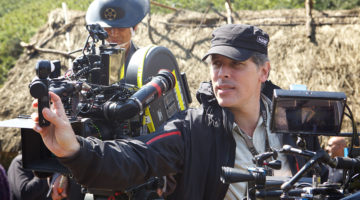Interview: Alex Garland Talks Allegiances and A.I. in Ex Machina
Alex Garland is unapologetically Team Ava.
It’s the artificial intelligence corner of the contentious triangle that writer and director Garland aligns with in Ex Machina, a chilling drama dressed up as a science fiction film. The enigmatic trio are as follows: the brilliant and rich creator in Nathan (Oscar Isaac), an idealistic protégé Caleb (Domhnall Gleeson), and the seductive Ava (Alicia Vikander) who is robot, prisoner, and maybe something more. Nathan invites Caleb, who works for his company, to his isolated research centre to test the worthiness, the believability of his latest project: an artificially intelligent gendered creature in Ava.
“All I can say is I’m with Ava,” Garland told a group of journalists while in Toronto promoting the film. “It comes down to proximity; it’s where you choose to stand in the story. It’s a three-hander, arguably a four-hander, but definitely three at the very least.”
“I see a sentiment creature trapped in a glass box,” continued Garland, who is credited as the writer and director but is quick to stress just how collaborative the work is. “There are weird things in the glass box,” he says, alluding to some hints and suggestions about the world around Ava. “On top of that, there is a jailer, and the jailer is predatory and frightening and intimidating. Then the jailer’s friend turns up, who may or may not be trustworthy.”
However, that is Garland’s perspective, and he is very aware that different people will watch and align themselves respectively. What’s more, they will also see some issues as more potent than others, as Ex-Machina raises questions about consciousness, morality, gender, sexuality, and purpose in life.
While Garland is very publicly on the side of Ava, he understands and appreciates that personal experiences will inform the viewer and lead to perhaps a different attachment, and went into making the film as such.
“I’m aware my own character and prejudices and instincts and unconscious will play its part,” he explained. “So I write the thing, and send it to three people: one’s a geneticist, one’s a feminist, and one’s an artificial intelligence researcher. I say ‘check it.’ They play very particular roles within their area, and I say, ‘I need you to take a cold look at this.’ Because not only am I trying to set them up with the characters, but I distrust myself.”
It seems likely that Ava and Caleb would be the two most popular choices for viewer’s allegiances but Isaac’s Nathan is not to be overlooked. He is creator, yes, but perhaps too a judge, and maybe even a god. He is setting in motion a series of actions that leads him specifically and humanity in general down a path where we must confront what it means to be conscious and whether or not we are all special, unique, and even important. He is crafting a test to rate the success of his project, but he may too be testing Caleb.
“One of my favourite things is that [Nathan] says things that sound unreasonable, but if you listen, it’s an uncomfortable truth,” said Garland. “It sounds like he’s lying, but it’s the truth. It just might not be a truth you want to hear.”
Garland talks about one scene in particular in which Isaac’s performance was most captivating. It’s a lengthy sequence that follows Nathan and Caleb through the corridors of this remote lab where they discuss sexuality and gender, and end up starring at a Jackson Pollack painting in his office.
“By the time we got there, I kind of lost track that I was supposed to be thinking about a lot of things,” said Garland. “I just completely locked into Oscar’s performance; it was so theatre-like, so hypnotic, like standing very close to theatre.” Nathan isn’t a typical scientist or CEO, he drinks a lot and works out, and Isaac decided he should have a Brooklyn accent to better bridge the jargon gap. He also says things like ‘dude’ and ‘bro.’
“[Isaac] got the weird, mixed vibe of being very sinister and very friendly at the same time.”
Whether or not he is one or the other, or both, is up to the viewer. The same goes for Ava and Caleb too. They are all flawed, and all guilty, and all inextricably linked.


